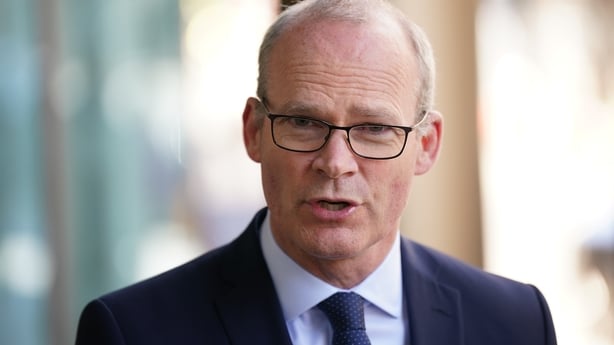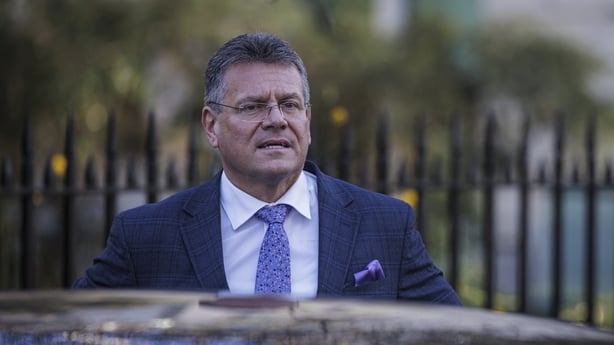Addressing DUP concerns about the Northern Ireland Protocol is key to ensuring "peace and stability" in the North, according to the British Ambassador to Ireland.
Paul Johnston insisted his Government would like to achieve changes to the protocol through dialogue and agreement.
But he warned: "If we're not able to go beyond where we are now in terms of looking for more significant change, then we're in a very serious situation."
The ambassador pushed back on claims from Minister for Foreign Affairs Simon Coveney that the manner in which concerns over the protocol are being raised has "ratcheted up tensions" in Northern Ireland.
"I think it's the fact that there is already a tense political situation in Northern Ireland," Mr Johnston told Prime Time.
"I think that's because the protocol is dividing opinion. We want to end that position. But the way you end it is actually by getting a broader base agreement in Northern Ireland to the protocol."

The ambassador said part of the issue is that the protocol does not command "cross-community support".
He noted that the protocol was resulting in additional costs and complexity for businesses in Northern Ireland.
Mr Johnston conceded that the status quo was allowing "strong trade" with the Republic of Ireland when asked about findings from the UK-based National Institute of Economic and Social Research, which concluded that the Northern Irish economy was growing faster than the rest of the UK due to the protocol.
"But the consequence of that is: it's much more difficult to trade between Great Britain and Northern Ireland," he said.
"So, there are lots of practical concerns, but there are also identity issues and wider issues as well. So it's really important to see it in the round, I think, and to see that this is causing problems. And our ambition is to find agreed ways forward."
While Mr Johnston emphasised Britain’s desire to reach an agreement with the EU, the British Foreign Secretary issued an effective ultimatum to the EU today, suggesting that the UK would unilaterally apply changes unless the bloc showed "requisite flexibility".
That threat amounts to a commitment to breach international law, but Mr Johnston said he would not be drawn into speculation about what could happen.
"What we have said is we will take the steps that will be necessary, in our view, to protect the ultimate objective, which is peace and stability," he said.

European Commission Vice-President Maros Šefčovič said today that the EU would do its utmost to protect Ireland's membership of the single market.
He said it was unacceptable that a third country could jeopardise anyone's EU status.
If Britain moves to scrap checks on some goods coming into Ireland, many fear the EU could insist on checks on the land border to preserve the integrity of the EU’s single market.
But Mr Johnston insisted that his government has been clear and in no circumstances wants to see any sort of checks on the border. But he thinks there is a workaround.
"Our strong view is that you can have a differentiated approach for goods that are only going to be consumed – only going to be sold in Northern Ireland," he said.
"There should be a regime which means there is a minimum of checks and bureaucracy.
"We have been clear that, in no circumstances do we want to put any sort of checks on the border – that an open border between Ireland and Northern Ireland is an extremely important part of what makes the Good Friday Agreement."





